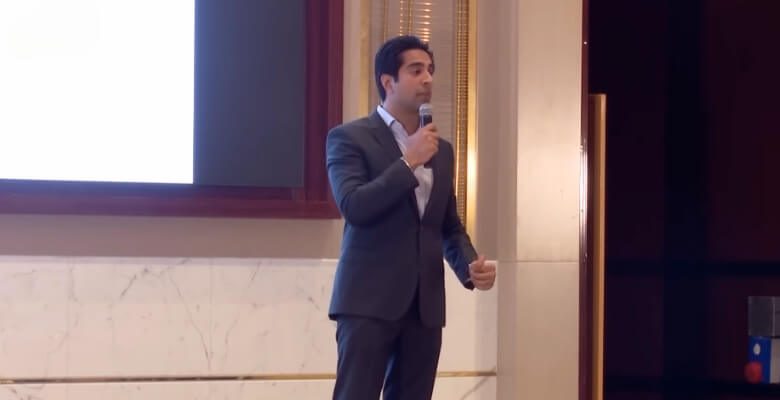A conference is an important tool for professional growth, providing opportunities for networking, learning, and sharing. A conference’s success often depends on the quality and expertise of its speakers, who can have a significant impact on attendees’ experiences. Having realized the importance of this, many organizers ask, “How do I contact speakers for a conference?”
Before contacting speakers for your conference, identify potential candidates and research their backgrounds. When it comes to inviting participants, use professional platforms such as LinkedIn or email to outline details of the event, benefits, and contact information.
This approach ensures you connect with the right speakers who can add immense value to your conference. Follow the next section of this article to explore detailed strategies and tips for successfully reaching out to and securing speakers for your event.
Conference Speakers- Why Are They So Important?
The quality and tone of a conference are highly dependent on the speakers. Their expertise and ability to engage the audience contribute to the conference’s overall success. Attendees often gauge the worth of a conference by the speakers it features.
Speakers who offer unique insights and valuable perspectives motivate participants to travel overseas to attend global conferences. Basically, attending a reliable conference with expert keynote speakers helps to gain valuable knowledge and fresh ideas that inspire innovation. Their presentations foster an environment of learning and professional growth, which is essential for attracting a diverse audience and enhancing the overall value of the event.
Speakers also encourage networking, sparking conversations among attendees from various fields. These interactions can lead to collaborations and partnerships that might not have otherwise occurred. The presence of esteemed speakers significantly contributes to the conference experience.
Who Usually Speaks at a Conference?
The purpose of conferences is to exchange ideas and spread knowledge among attendees. They draw speakers from various sectors, each bringing unique insights. Here we explore who typically graces the stage at these events:
Industry Experts
Industry experts share their specialized knowledge, often gained over years of experience. They provide practical insights applicable in professional settings.
During the conference, attendees learn about current trends as well as future predictions. This makes their sessions highly valuable and sought after.
Academic Professionals
Professors and researchers discuss recent studies and academic advancements. Their talks are rich in data and theoretical knowledge. They often connect complex concepts with real-world applications. Academic professionals help deepen their knowledge of complex subjects.
Business Leaders
CEOs and business founders share strategies that led to their success. They offer lessons learned from failures and achievements. Attendees gain insights into effective leadership and management practices. These leaders inspire us through their own stories of overcoming challenges.
Technology Innovators
Tech innovators showcase the latest developments in their fields. They discuss technology’s impact on various industries. Their sessions highlight innovations that could change market dynamics. Participants get a glimpse of the innovative technologies shaping our world.
Motivational Speakers
Motivational speakers inspire personal and professional growth. They use stories of strength and determination to energize the audience. Their sessions are designed to boost morale and spark motivation. These speakers often become the highlight of the conference.
Each type of speaker contributes to a rich weave of learning and inspiration at conferences. With their diverse backgrounds and perspectives, each attendee leaves with valuable knowledge.
How Do I Contact Speakers for a Conference?
Organizing a conference can be a challenging task, and one key element is securing the right speakers. These individuals can boost your event, drawing in attendees and increasing the experience. Here is the breakdown of how you can effectively contact speakers for your conference:
Step 1: Identify Potential Speakers
The first step is determining who you want to speak at your conference. Think about what expertise and skills of a professional keynote speaker would add the most value to your event. Look for thought leaders, industry experts, or innovators who align with the conference’s theme. Tools like social media, academic publications, and industry news can be great resources for finding potential speakers.
Next, you need to gather the contact details of these potential speakers. Websites, LinkedIn profiles, or professional directories usually provide this information. Make sure you have the correct contact details. Keeping a list of these contacts organized will simplify the process.
Step 2: Send a Personalized Invitation
An invitation with a personal touch is essential. Clearly explain the purpose of the conference in your message. Mention the event’s theme, the expected audience, and why you think they would be an ideal fit. This personalized approach shows respect for their achievements and expertise.
In your invitation, include logistical details like the date, location, and any compensation or benefits, such as travel and accommodation arrangements. Ensuring all details are clear can prevent misunderstandings. Inviting a guest speaker effectively often hinges on how well you present your event as a valuable opportunity.
Step 3: Follow Up Respectfully
After sending your initial invitation, give the potential speaker some time to respond. If you haven’t heard back within a week or two, it’s appropriate to send a polite follow-up email. Express your continued interest and inquire if they require more information to make a decision.
It’s important not to press too hard. Multiple follow-ups are acceptable but space them out to respect the potential speaker’s time and commitments. A respectful approach increases your chances of receiving a positive response.
Step 4: Negotiate and Confirm
Once a speaker shows interest, be ready to discuss details like honorariums, travel accommodations, and the event schedule. Transparent negotiation about expectations from both sides ensures a smooth experience. Being flexible and accommodating can help seal the agreement.
Finally, once all terms are agreed upon, send a confirmation email detailing everything agreed upon. This email serves as a reference for both parties and prevents last-minute confusion. Make sure this communication is professional and comprehensive.
Step 5: Prepare for the Event
With your speakers confirmed, keep communication open as the event approaches. Provide your speakers with all the necessary information about the audience, event schedule, and session specifics. Also, ask them if they have any special requirements for their presentation.
Offer your assistance with their travel arrangements and stay, if applicable. A well-prepared speaker is more likely to deliver a successful presentation, making your conference a memorable event.
Why Should You Connect with a Speaker?
Connecting with a speaker can be a valuable experience, both professionally and personally. Building these connections can expand your network, develop your knowledge, and open up future opportunities. Here’s why reaching out to speakers can be a smart move:
Gain Insights from an Expert
Speakers often possess specialized knowledge and experience in their fields. Reaching out provides a chance to learn directly from an industry expert. These insights can help you tackle challenges or refine your skills. Their unique perspectives may even inspire fresh ideas in your work.
Strengthen Your Professional Network
Building relationships with speakers strengthens your professional network in meaningful ways. A strong network can lead to collaborations and job opportunities. By connecting, you become part of a broader professional community. It also increases your credibility by associating with established individuals in the field.
Ask for Guidance on Your Career Path
Many speakers are open to providing career advice and guidance. Connecting allows you to seek insights on achieving your career goals. Speakers often share their journeys, which can be motivating for you. This advice can be invaluable for your professional growth and direction.
Gain Exposure to New Perspectives
Speakers bring new and varied viewpoints that broaden your perspective. Exposure to fresh ideas can challenge and expand your thinking. Understanding diverse views is valuable for personal and professional growth. These perspectives can also help you stay adaptable in an ever-evolving industry.
Explore Opportunities for Collaboration
Collaborating with an experienced speaker could lead to exciting professional ventures. Connections made here might lead to joint projects or research opportunities. When asking someone to be a keynote speaker, you should remember that you want to create an environment for shared expertise. In that case, collaboration adds value and enriches your knowledge and experience.
Dealing with Challenges – What If a Speaker Doesn’t Respond?
Reaching out to speakers can sometimes lead to silence, which can be frustrating. Knowing the reasons behind their lack of response is essential. Here are some tactics to manage and overcome this challenge efficiently:
- Check Your Communication Method: Sometimes emails get lost in spam folders or overlooked. Make sure the email address is active and correct.
- Send a Follow-Up: A polite follow-up email will serve as a gentle reminder if the first email doesn’t get a response. Continually express interest and ask for more information if needed.
- Explore Alternative Contacts: Try contacting them through different channels if direct emails fail. Professional networks like LinkedIn sometimes produce better responses.
- Assess Your Approach: Review your invitation to ensure it’s clear and engaging. A compelling invitation is more likely to receive a response.
- Extend Your Speaker List: Always have a backup speaker list. If initial choices do not respond, move quickly to invite others.
- Stay Flexible with Dates: Sometimes non-responsiveness is due to scheduling conflicts. Providing flexible dates might help them find a time that works for them.
FAQs about How Do I Contact Speakers for a Conference?
Here are some of the FAQs and their relevant answers for a clear concept of how do I contact speakers for a conference:
How Far in Advance Should I Contact Speakers?
Ideally, reach out to speakers at least 3-6 months before your conference to allow ample time for scheduling and preparation. This lead time helps secure high-demand speakers and enables them to plan around your event.
What Should I Do if Multiple Speakers Want the Same Time Slot?
Discuss alternative time slots with speakers to accommodate their schedules. If necessary, consider parallel sessions, allowing attendees a choice without compromising on the quality of the experience.
How Can I Make Speakers Feel Valued and Appreciated?
Express gratitude for their participation and acknowledge their expertise, which contributes to the event’s success. Providing support, including assistance with logistics and offering a warm welcome at the conference, helps speakers feel valued.
Should I Invite Multiple Speakers for The Same Slot?
It’s smart to have backup speakers ready if your preferred choice is unavailable, ensuring your schedule stays intact. Avoid double-booking, though, as it can lead to confusion and logistical challenges.
Can I Invite Speakers Who Are Located Internationally?
Yes, international speakers add diversity and global insights to your conference. Just be mindful of time zone differences and consider offering flexible scheduling to accommodate their location.
What Should I Do if A Speaker Cancels Last Minute?
Having a contingency plan with backup speakers is essential for such situations. Alternatively, fill the gap with engaging activities or discussion sessions to keep attendees engaged and maintain the conference flow.
Final Thoughts
In organizing a successful conference, contacting the right speakers is essential for creating a valuable experience for attendees. By identifying potential candidates and crafting personalized invitations, you can engage experts who align with your event’s goals. Maintaining respectful communication and following up, as well as having contingency plans, will increase your chances of securing impactful speakers.
When wondering “How do i contact speakers for a conference?” remember to use professional networks, ensure clarity in your invitation, and stay adaptable. These efforts help build connections that add value to the conference experience, promoting networking, learning, and growth. Thoughtful planning and attention to detail ultimately lead to a memorable and meaningful event for all involved.








